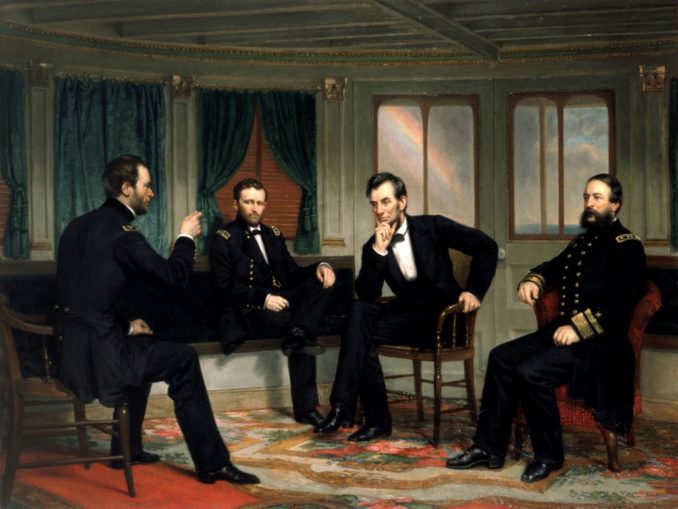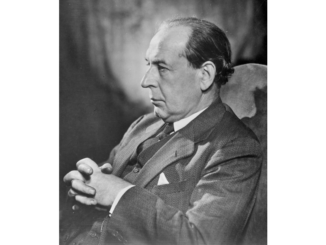
George Peter Alexander Healy, Public domain, via Wikimedia Commons
“History shall be kind to me for I shall write it” wrote Sir Winston Churchill at the end of the Second World War. He had previously written a six volume history of the First World War about which former Prime Minister Arthur Balfour is alleged to have remarked “Winston has written six volumes about himself and called them “the World Crisis”” However it is generally true that the victors write the history but a stark exception was the American Civil War. For decades afterwards, Northern historians would describe the battles but Southern historians would lament their “Lost Cause”, their heroes such as Robert E Lee, extolled as some modern equivalent to Chaucer’s “perfect gentle knight” but who in fact had at least once personally administered the lash to his slaves, and , in particular, to the post war Reconstruction. Even they realised that the memory of the slain national hero, Abraham Lincoln, still America’s greatest President, ought not to be attacked so that their concentrated on the reputation of his successor but one and his Commander in Chief, General U S Grant instead. For a hundred years after, Grant has routinely been ranked as one of the worst Presidents ever, possibly exceeded only by Franklin Pierce and James Buchanan. However, most of this was bile and spite and in recent years his Presidential reputation has recovered to place him at least in the middle rank.
Hiram Ulysses Grant (always known by his second Christian name) was born in Ohio in 1822, the eldest son of a farming family. He was nominated, then sent to West Point, very much against his wishes,, where he had been mistakenly registered as Ulysses Simpson Grant, a name which he subsequently adopted and which later gave rise to “US Grant” “Unconditional Surrender Grant” and “Uncle Sam” which gave him his lifelong name between friends of Sam Grant. He graduated from West Point, distinguished himself in the US/Mexico war of 1846 but in subsequent peacetime, resigned his commission and left the army owing to boredom and drink which was a lifelong weakness.
Grant spent a decade failing in one business venture after another, although when his wife inherited a few slaves, he freed them then re employed as workers. He was working as a clerk in his father’s tannery business in Galena, Illinois when the Civil War broke out. As a West Point graduate he was given command of an Illinois regiment of volunteers and was so successful that he was rapidly promoted to Brigadier. He came to national prominence with essentially the first two Union victories of the War in a period of otherwise constant defeat when he captured in swift succession Fort Henry on the Tennessee River and Fort Donelson on the Cumberland River, opening up the State of Tennessee in general and its capital Nashville in particular for occupation.
As this is a brief overview of his Presidency, I shall not dwell on Grant’s subsequent war in too much detail. He won the first total bloodbath of the war at Shiloh, after which Congress tried to have him sacked for the casualty list ( “I can’t spare this man. He fights” was Lincoln’s response) or alleged drunkenness as to which Lincoln innocently enquired which brand he drank “so I can send some to my other generals”. He captured Vicksburg in 1863 to open the Mississippi River to commerce in a campaign of such original brilliance that it was studied in military academies for decades afterwards, he relieved the siege of Chattanooga and ultimately was given overall command of the Union Armies where he joined General Meade’s Army of the Potomac in the field where he then successfully defeated General Robert E Lee and his Army of Northern Virginia after the Wilderness campaign of 1864 and the subsequent siege of Petersburg to end the war in the Spring of 1865 after capturing the Confederate capital of Richmond, Virginia and taking the surrender of Lee and his army.
Lincoln’s assassination left a political vacuum .His Vice President , Andrew Johnson (chosen for his Southern connections), was not up to the task as being seen to be too conciliatory to the defeated South and their readmission without racial desegregation so that the Republican Party nominated Grant, who had first commanded the occupying army and then entered cabinet, as Presidential candidate which he won in 1868 and re elected four years later.
US Civil Rights are known for the famous Supreme Court cases in the 1950s decided by Chief Justice Warren such as the Rosa Parkes case on the segregated seating on the buses of Montgomery, Alabama or Brown vs Board of Education involving the segregation of schooling. That they were the product of the then discredited administration of President Grant was quite forgotten, presumably as they did not suit the narrative of the post FDR Democratic Party, with its previous history of slave owning leaders and supporters, that the Republican Party were the historic guarantors of the rights of African Americans, a position that President Trump has sought to regain. Grant passed the 14th Amendment to the Constitution which stated that “nor shall any state…deny to any person within its jurisdiction the equal protection of the laws” and the Civil Rights Act 1875 which provided that all persons should have “full and equal enjoyment” of public services. The Supreme Court pushed back in many cases against the ordinary meaning of these words culminating in 1896 when it defined “equality in civil rights” not “equality in social arrangements” so that “equal but separate” (in reality nothing like) segregation was constitutional. President Grant also put down the first creation of the Ku Klux Klan which has reappeared at regular intervals since.
As President, Grant established the world’s first National Park when he passed the Yellowstone National Park Act 1872 to create two million acres in Wyoming and Montana “for the benefit and enjoyment of the people” and set a precedent which has been followed worldwide to this day.
Sometimes on this blog there are arguments as to whether there is indeed an “International Law”. If there is, it is indebted to the Alabama Arbitration between Grant’s US administration and Gladstone’s UK government. The Alabama was built as a warship but unarmed in Birkenhead by the Confederacy and was allowed to put to sea after much US protest, later receiving her guns once at sea. At the end of the Civil War, the US government presented a claim for the direct and indirect losses caused to and by the 65 ships she sank or captured before she was herself sunk in battle in the English Channel. The UK government considered itself vulnerable and proposed an arbitration of the claim in Geneva. It was heard by five judges, one from the UK , one from the US and the remaining three from countries friendly to both. It resulted in the Treaty of Washington of 1871 with UK paying $15,500,000.00 to the US in settlement but with a declaration of permanent friendship between the nations which has lasted to this day. It established the principle of binding international arbitration as a way to resolve international disputes.
President Grant’s unfavourable reputation partly rests on the onset of the “Long Depression” of 1873 on his watch. In recent years, comment has been made as to whether there is an economic super cycle of major downturns every 60 to 70 years. Certainly the four in modern history commenced in 1816, 1873, 1929 and 2008 so there may be something in it. However Grant’s administration took part of the blame and some unwise political appointments tainted his administration with bribery (not Grant personally) and corruption. Some things never change.
After office, Grant’s subsequent history was heart breaking. It started well enough with a world tour which included a stay at Windsor castle as a guest of Queen Victoria. However Grant went into business as a partner in a Wall Street brokerage house run by a fraudster. He was ruined. He was rescued in part by the businessman W H Vanderbilt who acquired his debts in exchange for his assets to save him from bankruptcy but allowed him to stay in his home. He developed mouth cancer as a result of his cigar habit and worried that that he had nothing to leave to his family to secure their future. His friend Mark Twain persuaded him to write his memoirs which Twain was able to syndicate for him at vast profit for the time. The book, “Personal Memoirs of U S Grant”, is still regarded as the best Presidential autobiography ever written. The last chapters were written in a period of intense suffering and he died in 1885 five days after laying down his pen for the last time.
For a century after his death, Southern historians gave him the reputation of being a great military commander but an equally poor President . At last his Presidency is being looked at again in a far better light.
© Bergen 2024



